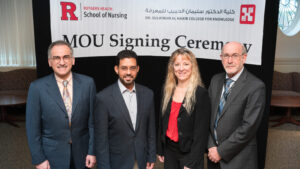Rutgers and Saudi nursing school forge partnership to strengthen global nursing workforce
October 24, 2025

Pictured (L-R), Drs. Ayman Al Khadra, chief medical officer at Dr. Sulaiman Al Habib Medical Group; Dr. Monir M. Almotairy, founding dean and associate professor at Dr. Sulaiman Al Habib College for Knowledge; Dr. Angela Starkweather, dean and professor at Rutgers School of Nursing; and Dr. Jeffrey Carson, Provost at Rutgers Health- New Brunswick.
Dr. Sulaiman Al Habib College for Knowledge delegation visits U.S. to launch collaborative agreement
Against the backdrop of a global nursing shortage and growing demand for skilled health professionals, Rutgers University School of Nursing and Dr. Sulaiman Al Habib College for Knowledge of Riyadh, Saudi Arabia, have joined forces to expand nursing education and promote international collaboration.
During a three-day visit to Rutgers’ New Brunswick and Newark campuses, leaders from the newly established Saudi nursing college met with Rutgers faculty and administrators to explore academic models, clinical partnerships, and student support systems. The visit included the signing of a Memorandum of Understanding (MOU) establishing a framework for academic exchange, joint research, and shared learning between the two institutions.
The Dr. Sulaiman Al Habib College for Knowledge—a private, nonprofit institution founded in September 2024 under the Dr. Sulaiman Al Habib Medical Group, one of the Middle East’s largest health-care systems—admitted its first class of nursing students in August 2025. The new nursing institution aligns with Saudi Arabia’s national strategy to strengthen its domestic nursing workforce and reduce dependence on international labor.
“Health-care challenges transcend borders,” said Angela Starkweather (PhD, ACNP-BC, FAANP, FAAN), dean and professor at Rutgers School of Nursing. “By sharing knowledge, research, and innovation, we can prepare nurses everywhere to meet the needs of their communities—and, in doing so, improve health outcomes globally.”
“Our collaboration with Rutgers is an investment in the future of nursing education in Saudi Arabia,” said Monir M. Almotairy (PhD, EMBA, APRN, FAANP, FAAN), founding dean and associate professor at Dr. Sulaiman Al Habib College for Knowledge. “We are delighted to be thought partners alongside Rutgers in areas such as leadership, faculty development, simulation, curriculum enhancement, student engagement, and to bring those lessons back home to benefit our health-care system.”
Building Saudi Arabia’s Nursing Pipeline
Saudi Arabia faces a serious nursing shortage as health care demands rise and the nation works to expand access under Vision 2030. The country has long relied on an expatriate workforce, with Saudi nationals accounting for only a small percentage of practicing nurses.
To improve care quality, Saudi Vision 2030 calls for broad health-system reforms that expand local training and career opportunities. In response, both government and private sectors are investing in nursing education, scholarships, and faculty development—particularly to recruit and retain Saudi citizens.
The establishment of the Dr. Sulaiman Al Habib College for Knowledge reflects this national commitment to building a self-sustaining nursing workforce and advancing professional education through global collaboration.
A Framework for Collaboration
The MOU—the first between Rutgers and Dr. Sulaiman Al Habib College for Knowledge—outlines four primary areas of collaboration: faculty development, curriculum innovation, student and faculty exchange, and the design of future postgraduate nursing programs. Together, the institutions aim to strengthen nursing education and research, promote academic and cultural exchange, and build long-term capacity within Saudi Arabia’s health-care system.
“Initiatives like this foster genuine two-way learning,” said Emilia Iwu (PhD, RN, FAAN), assistant dean of global health and clinical associate professor at Rutgers School of Nursing. “Working alongside our international colleagues allows us to learn from each other’s strengths, share innovations in education and practice, and advance nursing together—in the U.S. and abroad.”
Iwu, who will coordinate the initiative alongside Caitriona Brennan (MA, PGDip), director of education and training, added, “Together, we’re creating pathways for faculty and students to grow as global citizens and leaders in health care.”
In addition to Almotairy and Brennan, the visiting delegation comprised Ayman Al Khadra (MD), chief medical officer of the Dr. Sulaiman Al Habib Medical Group, and Abdullah Bukhari (MD), executive director of academic affairs at the College for Knowledge.
“This partnership exemplifies Rutgers Health’s commitment to working across borders to advance education, research, and patient care,” said Brian L. Strom (MD, MPH), chancellor of Rutgers Health and executive vice president for health affairs at Rutgers. “By helping to launch and strengthen new programs in nursing and health professions worldwide, we extend Rutgers’ mission of improving health and transforming care on a global scale.”
A Week of Exchange and Discovery
From October 22 to 24, the delegation met with Rutgers leaders and faculty representing every facet of nursing education—from admissions and academic affairs to simulation, research, and clinical partnerships. The program included a tour of the Division of Simulation and Clinical Learning, as well as working sessions on topics such as graduate and undergraduate nursing programs, faculty and student exchange opportunities, and joint research initiatives.
Global Impact, Local Outcomes
The new partnership marks Rutgers School of Nursing’s latest step in advancing global engagement and health equity. The Center for Global Health leads this effort by promoting international collaboration, education, and research that connect Rutgers faculty and students with partners across Africa, Asia, the Middle East, and Latin America. Its programs include study abroad opportunities, global research collaborations, and capacity-building initiatives that strengthen nursing education and practice in diverse settings. The center also supports visiting scholars and international fellowships focused on addressing emerging global health challenges.
